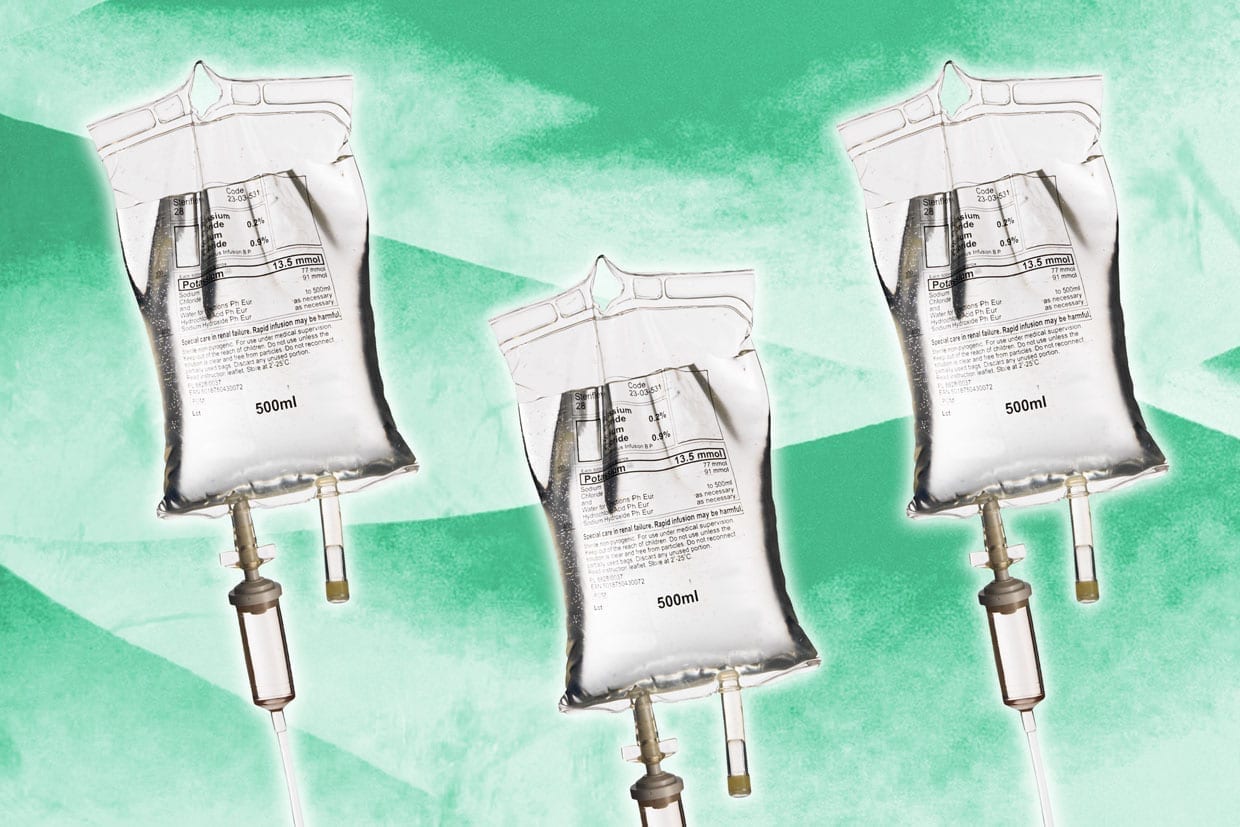In the world of health and wellness there are always treatments promising to cure all your health concerns. It is no wonder we gravitate towards them — who wouldn’t want to pop a magic pill that would solve all their health problems with zero effort? While not quite a pill, IV therapy treatments make a similar promise — they are touted as a cure for everything from hangovers, to chronic fatigue, to jet lag, to the common cold — but are they legit?
Wellness influencers seem to think so — there are over 41,000 #ivdrip posts on Instagram that make sitting with an IV in your arm for anywhere from 20 minutes to two hours look less like a sterile hospital scene and more like a treatment at a glamorous health retreat. That is due in part to the fact that IV wellness centers — part Zen meditation spa, part sleek doctor’s office — are popping up all across the country. In New York and Los Angeles, IV-focused wellness centers like NutriDrip, a “nutrition and hydration IV drip lounge,” and Infuse Wellness, are easily at home among fancy wellness studios offering devotees the latest fads — the trend has even reached cities like Houston, Kansas City and Scottsdale, too.
https://www.instagram.com/p/BS9bki3B-py/
“The hangover cure kind of started this trend,” says Jim Curtis, CEO of Modrn Sanctuary, a holistic wellness center in New York that offers IV drip therapy in addition to New Age-y treatments like sensory crystal beds and infrared salt saunas. The idea is simple: When you are begging for mercy after a night of too much drinking, an IV drip works to rehydrate your body (and bring sweet relief) fast. “You can also put anti-nausea and headache medications in the IV as well,” says Curtis, who is an avid user of IV treatments for everything from dehydration to stress.
The Promise of IV Drip Treatments
From hangover cures, IV drips — which can cost anywhere from $99 for a quick hydration boost to over $600 for bespoke drips — quickly spilled over into other areas of wellness. If curing a wicked hangover could be as easy as jumpstarting your system with a little extra fluid, why not use the same idea to treat a headache? Or give you an energy boost? Or give you glowier skin? Or even cure your cold? “People are finding when cold and flu season comes around, getting an immunity treatment” — which are typically packed with immune system-boosting vitamins like zinc and vitamin C — “can help shorten a cold or stave it off completely,” Curtis says.
The idea behind the magical-sounding benefits is that a high dose of vitamins straight to the bloodstream (rather than, say, taking a multi-vitamin and drinking plenty of water) is a more efficient way of getting the good stuff into your system — devotees swear by it. “I have severe muscle spasms and when I get a drip that has magnesium in it, I immediately [feel] relief,” Curtis says.
So, Do IV Drip Treatments Really Work?
The magic of IV treatments does have some science behind it — just not for the number of people Instagram might have you believe. “IV vitamin drips are used primarily for patients who have confirmed diagnoses in which they cannot absorb certain nutrients,” says Niket Sonpal, M.D., an assistant adjunct professor at Touro College of Osteopathic Medicine in New York. Typically, that applies to patients with certain food sensitivities like gluten allergies or celiac disease, he explains, who might have issues absorbing vitamins and minerals through their GI tract.
For the rest of us, the science does not support it — IV drip treatments are likely overkill, Sonpal says. “If you eat a well-balanced diet, your body does not need the extra vitamins,” he explains. “Frankly, you are just creating very expensive urine by adding on IV vitamins.”
https://www.instagram.com/p/BqI18_YA-1m/
So why do so many people swear by the trendy treatment? It is likely part placebo effect and part hydration. “Most people don’t drink enough water and when our bodies get that bonus of fluid from the IV drip, most people would feel great,” Sonpal says.
Are IV Drip Treatments Safe?
Nothing is safe for everyone — for people with conditions like heart failure and kidney problems, extra fluid in the body can cause serious complications. This is why “it’s really important you go somewhere with someone on staff who can figure out what’s good for you,” Curtis says.
You might be giving yourself levels of vitamins you do not need
The more common concern, Sonpal says, is overdosing on vitamins. When you get nutrients through an IV, your body really does absorb them more directly, he explains, but this means those vitamins and minerals do not pass through the supply and demand check point that normally acts as a filter in your gut. Translation: You might be giving yourself levels of vitamins you do not need, Sonpal says. Depending on the vitamin, overdosing can cause issues ranging from severe rashes, to liver disease, to neurological injury.
Below are the warning signs to watch out for with vitamin levels.
Vitamin D
Too much D can lead to nausea, vomiting and digestive issues. If severe enough, it can even cause heart or kidney damage.
How much is too much: You would have to take a lot of vitamin D over several months to do any serious damage — 60,000 IU (which is about 100 times the recommended daily amount) has been shown to cause toxicity.
Vitamin B
B vitamins help support everything from healthy skin and hair to sharp mental function — but too much of a good thing can still be toxic. Specifically, too much vitamin B6 has been linked to nerve damage and too much vitamin B3 (aka niacin) can cause nausea and liver damage.
How much is too much: Keep your vitamin B6 levels around 100 milligrams and your B3 levels below 500 mg.
Vitamin A
Overdoing it on vitamin A can be particularly worrisome — since it is a fat-soluble vitamin, it accumulates in your tissues where it is stored long-term. Over time, too much vitamin A can cause symptoms like hair loss and dry skin, or more seriously, liver issues.
How much is too much: The recommended daily intake of vitamin A is 3,000 IU for adults — make sure you are not regularly consuming more than that in your diet and any additional supplements.
Like any unregulated supplement, there are also concerns over what exactly is going into the IV bag. Before you get any IV drip treatment, ask what nutrients are going in the bag and how they are sourced, Curtis says. He recommends visiting a clinic that does not use pre-made bags, but instead tailors each individual IV drip to you. This way, you can have a conversation with the practitioner about what exactly goes in the bag.
You should also note who will be administering the drip before you get the treatment, Curtis says. Make sure it is a doctor, EMT, nurse practitioner or IV-certified technician — anything less is not legal.
The Bottom Line
IV drip treatments are not magic — though they may help you stay hydrated. “I wouldn’t ever recommend that you eat terribly and then just go get a vitamin drip. If you’re stressed out and anxious, it’s not going to replace a meditation practice,” Curtis says. “IV drip treatments are a combination therapy — they don’t replace a healthy lifestyle.”
If you are curious, proceed with caution. And as with any unprescribed supplement, make sure you talk to your doctor before you use it to make sure it will not interfere with any health conditions or existing medications.
We only recommend products we have independently researched, tested, and loved. If you purchase a product found through our links, Sunday Edit may earn an affiliate commission.







